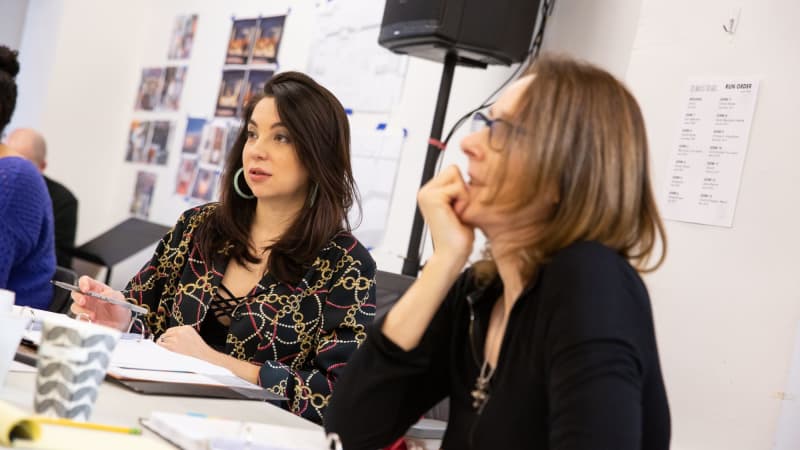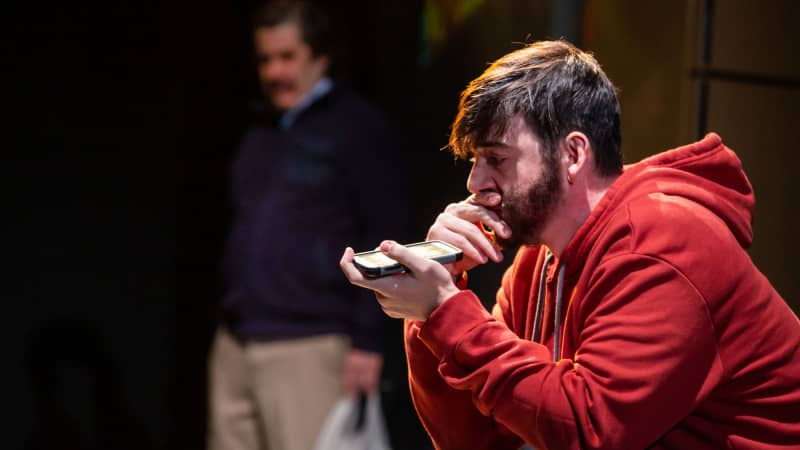72 Miles to Go...:
An Interview with Playwright Hilary Bettis
Posted on: February 28, 2020
Education Dramaturg Ted Sod spoke with Hillary Bettis about her work on 72 Miles to Go...
Ted Sod: Where were you reared and educated? When did you realize that you wanted to write for the stage and screen?
Hilary Bettis: My family moved a lot growing up—South Carolina, North Carolina, Georgia, and Colorado. We moved to rural Minnesota halfway through my freshman year of high school. I went to a tiny public high school where our curriculum revolved around the Bible, abstinence, and agriculture. I grew up with horses and chickens and loved learning about agriculture, but religion was becoming a harder pill to swallow.
At 16, I decided I was done with school and the last thing I wanted to do was go to college. So I moved to L.A. a week after graduation. I bounced around a lot and got into some trouble, but LA also cracked open the world for me. I saw how circumstances define our choices, not our dignity. I started wondering why movies and TV never portrayed stories about the people I encountered every day. One day, I volunteered at a theatre in North Hollywood in exchange for free food! They were doing a production of Death of a Salesman. It was the first time that I had seen theatre. I was so blown away! I started voraciously reading plays. And then I realized the only way to see stories about the world I knew was to write them. So I taught myself to write. I would break down a play, line by line, word by word, try to understand what was happening, then try to recreate my own characters and story based on that structure.
In 2013, I got a fellowship to Juilliard. That was my first and only academic experience. They take only 4-5 writers a year, and most have their undergrad and MFAs. So I had to figure out how to keep up with them. Being in a room with brilliant, talented, prolific, disciplined writers under the mentorship of Marsha Norman and Chris Durang taught me what it means to be a serious writer.
TS: What inspired you to write 72 Miles to Go…? What would you say your play is about?
HB: Oh, so many things! There’s the personal family history. My mother grew up in Tucson, Arizona, and always talks about how wonderful and magical Tucson was. All of the characters in the play embody my family in some way. My father’s a Methodist minister, my grandfathers and brothers joined the military, my mother’s a nurse. My grandfather experienced a lot of ugly racism growing up in Texas. He believed being as Americanized as possible was the only way to survive, so he learned to speak English with no accent, refused to teach his children Spanish, and denied anything culturally Mexican. I feel like I’m on this life-long search to understand who we are and what the Mexican-American identity means to me.
72 Miles to Go… is really a love story. It’s about Anita and Billy’s unwavering loyalty to each other, their deep intimacy and connection despite only having a telephone to bridge the distance. It’s about the sacrifices a family makes for each other out of love, no matter what it costs them personally—their dreams, education, safety.
TS: How did you develop this play? Can you give us some insight into that process?
HB: Michael Legg and Rachel Lerner-Ley invited me to be a guest artist at WildWind Lab at Texas Tech and develop one of my plays with the students. It seemed like a great opportunity to start a new play. I ended up writing the first 50 pages in a week. I spent the rest of the summer bouncing from residency to workshop to rehearsal for other projects while trying to finish the first draft. I was also writing on “The Americans” at the time, and that show taught me everything about writing family drama. Joel Fields, the showrunner, and Joe Weisberg, co-showrunner and creator, were always pushing us to write the most honest and intimate version of every moment of that show. And that seeped into 72 Miles.
After I finished the first draft, I did some early readings of it at Roundabout. Jill Rafson, the associate artistic director at Roundabout, has always been a huge advocate of this play. I did readings of it with New Neighborhood, Orlando Shakes PlayFest, and Two River Theatre’s Crossing Borders Festival. The play was also a finalist for the Susan Smith Blackburn Prize. The Alley Theater in Houston did a workshop production, directed by the brilliant José Zayas, for their All New Festival, which was one of the best experiences of my career.
Most of our audience at the Alley had a very personal connection to the play. We did a student matinee for over a hundred mostly Black and Latinx kids from all over Houston. Many of them had never seen theatre before. I was legit terrified because teenagers are tough critics, unapologetic in their opinions, and will let you know how they feel. But these kids were, hands down, the best audience I’ve ever experienced. They laughed, they cried, they gave Eva a standing ovation after her graduation speech. They brought the room to life in such an honest way. It’s something we forget as adults. José and I did a talkback with them, and they all had stories. Some shared that their parents were undocumented and they never really thought about what their parents gave up for them to have lives in America. Others shared that seeing this play made them want to write, that they never thought writing was a possibility for them until now.
TS: I want to ask you about collaborating with Jo Bonney, the director. What made you want to work with her?
HB: Jo Bonney is one of the directors I fell in love with when I first moved to New York. Her work is grounded, yet theatrical. She understands nuance and naturalism, yet allows the story to inform the theatricality. Trying to find a director for this play was really complicated, and I had to ask myself a lot of hard questions about the needs of the play, representation, and my own strengths and weaknesses. Ultimately, I really wanted to work with a seasoned director who has incredible mastery of craft. Jo really has no stakes in this other than wanting to honor these characters and this story.

Hilary Bettis and Jo Bonney
© Jeremy DanielTS: Can you talk a bit about the choice of making Billy a Unitarian minister. Why was that important to you?
HB: When your father is a minister, you spend a lot of Sundays at church. I have very vivid memories of watching him sit at the kitchen table writing a sermon all week, quietly muttering it to himself around the house. He’s a very gentle and thoughtful man, much like Billy, who’s always believed there’s a place at the table for everyone.
The Sanctuary movement originated in Tucson, Arizona in the 1980s when Central Americans were fleeing brutal wars in Guatemala and El Salvador. The Reagan Administration passed policies aimed at preventing these refugees from claiming asylum, and instead labeled them as “economic migrants.” Many denominations (Presbyterians, Unitarians, Catholics, Jewish, Quakers) started harboring these people so they wouldn’t be deported to certain death. The Unitarian Church in Tucson is incredibly active in protecting migrants. They work with the non-profit organization called No Mas Muertes that provides humanitarian aid for people crossing the border.
Billy found Anita and her infant son close to death when he was doing humanitarian work with the Unitarian Church in the desert. He nursed her back to health, they fell madly in love, and they’ve never looked back. Despite all the obstacles they go through. That’s what ultimately makes this play a great love story.

Bobby Moreno (Christian)
© Jeremy DanielTS: How did you come up with Billy’s relationship with his stepson Christian.
HB: I grew up in a house with all boys. I have three brothers and three stepbrothers. My stepdad was such a big part of day-to-day life with my brothers, and I watched them maneuver this complicated dynamic. I think the relationship between Billy and Christian is about how these two men—who deeply love and need each other—navigate a father/son relationship when it’s not blood that bonds them. Obviously, for Christian it’s a devastating betrayal when he learns Billy isn’t his biological father and he’s undocumented. Christian’s journey over the play, as he becomes a father, is realizing that he would do for his wife and kids everything Billy did. I think Billy truly thought amnesty was going to happen. Why tell his kid he can’t have his dream when he might be able to have his dream? And Billy has to reconcile the reality of the world that he’s living in with how he raised his son.
TS: What keeps you inspired as an artist?
HB: I believe what is happening to undocumented people is the human rights issue of this generation. I believe, as someone privileged enough to have a voice and a platform, I carry a responsibility to do everything in my power to shed light on this. Marsha Norman constantly told us, “Attention must be paid.” That is our responsibility as writers. This is what attention must be paid to right now in America.
TS: Do you have any advice for a young person who says they want to write for stage or screen?
HB: There’s the old adage, “Write what you know.” I used to hate it because it seemed so counter to imagination. But as I’ve gotten older, I’ve realized it’s less about being literal, and more about writing the parts of yourself that scare you the most. What makes you vulnerable? What do you struggle with deep down? I think a lot of writers who are just starting out, and I speak from experience, their first instinct is to lash out at the world. Or try to be clever or trendy or commercial or flashy. When you find the courage and humility to put that stuff aside, and write from the deepest and most empathetic and honest parts of yourself, that’s when you’ll tap into the stories only you can write. It’s also important to learn how to have discipline. For me, the difference between being an amateur and professional was learning how to write when the last thing I want to do is write—which is often.
